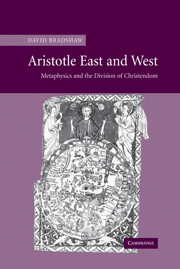Book contents
- Frontmatter
- Contents
- Preface
- 1 The Aristotelian beginnings
- 2 The Prime Mover
- 3 Between Aristotle and Plotinus
- 4 Plotinus and the theory of two acts
- 5 The Plotinian heritage in the West
- 6 Gods, demons, and theurgy
- 7 The formation of the eastern tradition
- 8 The flowering of the eastern tradition
- 9 Palamas and Aquinas
- 10 Epilogue
- Bibliography
- Index
2 - The Prime Mover
Published online by Cambridge University Press: 22 September 2009
- Frontmatter
- Contents
- Preface
- 1 The Aristotelian beginnings
- 2 The Prime Mover
- 3 Between Aristotle and Plotinus
- 4 Plotinus and the theory of two acts
- 5 The Plotinian heritage in the West
- 6 Gods, demons, and theurgy
- 7 The formation of the eastern tradition
- 8 The flowering of the eastern tradition
- 9 Palamas and Aquinas
- 10 Epilogue
- Bibliography
- Index
Summary
Up to this point we have traced two broad strands in the development of Aristotle's thought on energeia. Both take their beginning from his early use of the term to mean the active exercise of a capacity as distinct from mere possession of that capacity. In one strand we find Aristotle purifying energeia from its early associations with motion or change (κίνησις), distinguishing it as that type of activity that contains its own end and hence is not constrained to unfold through a temporal process. The other strand is rooted in the early distinction between energeia and dunamis in the sense of capacity. As Aristotle broadens dunamis to encompass all types of potency, he correspondingly broadens energeia to encompass all types of actuality. As we have seen, he goes on to argue that actuality is prior to potentiality in a number of respects, of which the most important is priority in substance. His argument for this latter claim hinges on the view that things existing eternally and of necessity, such as the stars and planets, are free of potency in respect to existence. There is thus an intimate link between eternity and necessity, on the one hand, and actuality on the other.
That link becomes a central theme of Metaphysicsxii.6–10, Aristotle's only sustained discussion of the Prime Mover.
- Type
- Chapter
- Information
- Aristotle East and WestMetaphysics and the Division of Christendom, pp. 24 - 44Publisher: Cambridge University PressPrint publication year: 2004



